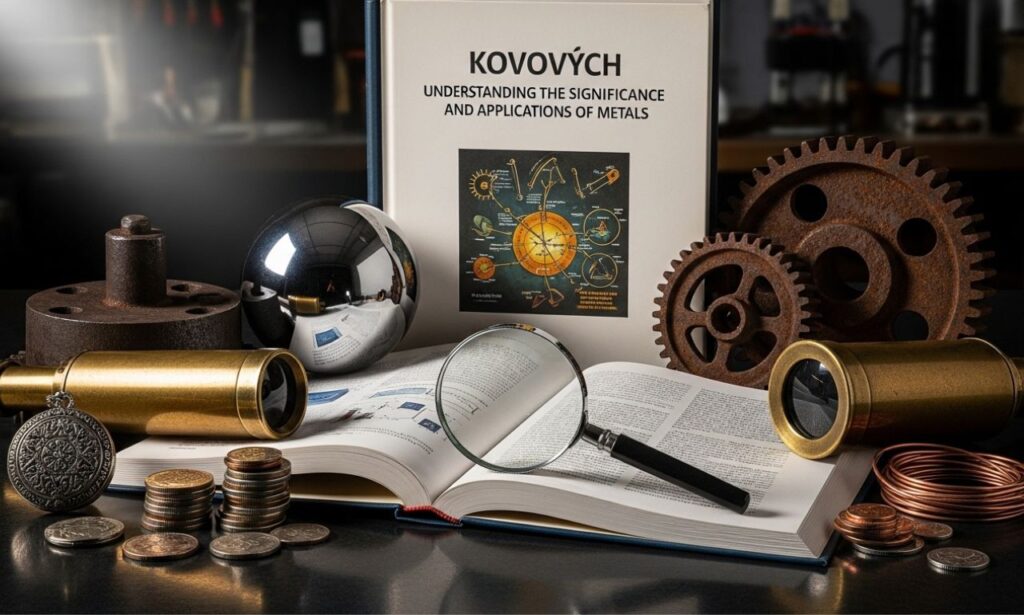Kovových, a term commonly associated with metals, plays a vital role in modern industry and daily life. From construction materials to high-tech applications, kovových are indispensable due to their unique physical and chemical properties. Understanding kovových helps us appreciate their impact on engineering, manufacturing, and technological advancements. In this article, we explore the characteristics, types, and applications of kovových, highlighting why these metals are essential in the contemporary world.
What Are Kovových?
Kovový-ch refers to metals and metallic elements known for their durability, conductivity, and malleability. Metals are typically solid at room temperature, with the exception of mercury, and possess distinct properties such as luster, high melting points, and strength.
Key Characteristics of Kovových
-
Conductivity: Metals conduct electricity and heat efficiently, making kovový-ch critical for electronics and energy transmission.
-
Malleability and Ductility: Kovový-ch can be hammered or stretched into thin sheets or wires without breaking, essential for industrial manufacturing.
-
Strength and Durability: Many kovový-ch are strong, allowing their use in construction, machinery, and transportation.
-
Corrosion Resistance: Some kovovýc-h, such as stainless steel and aluminum, resist rust and degradation, extending their lifespan.
Types of Kovových
Kovovýc-h can be categorized based on their properties, abundance, and applications.
Ferrous Metals
Ferrous kovovýc-h contain iron and are magnetic. They include:
-
Steel: Known for strength and versatility in construction and automotive industries.
-
Cast Iron: Durable and heat-resistant, used in machinery and cookware.
Non-Ferrous Metals
Non-ferrous kovovýc-h do not contain iron, making them resistant to rust and corrosion. Examples include:
-
Aluminum: Lightweight, strong, and widely used in transportation and packaging.
-
Copper: Excellent electrical and thermal conductor, commonly used in wiring and electronics.
-
Titanium: Strong, lightweight, and corrosion-resistant, ideal for aerospace and medical implants.
Industrial Applications of Kovových
The versatility of kovovýc-h has made them central to many industries.
Construction and Architecture
Kovovýc-h are integral in building infrastructure such as bridges, skyscrapers, and residential housing. Steel beams, aluminum panels, and copper wiring form the backbone of modern construction.
Electronics and Technology
The conductivity and malleability of kovový-ch make them ideal for electronic components. Copper circuits, aluminum heat sinks, and gold connectors are all examples of kovový-ch in technology.
Transportation Industry
Kovový-ch are crucial in manufacturing vehicles, ships, and airplanes. Steel frames, aluminum bodies, and titanium components enhance durability, reduce weight, and improve safety.
Everyday Items
From kitchen utensils to jewelry, kovový-ch are present in daily life. Stainless steel cutlery, aluminum foil, and metal watches demonstrate the widespread use of kovový-ch beyond industrial applications.
Environmental Considerations
While kovový-ch are valuable, their extraction and processing can impact the environment. Mining operations may lead to habitat destruction, soil erosion, and water pollution. Recycling kovový-ch has become increasingly important to reduce environmental impact and conserve natural resources.
Recycling and Sustainability
Recycling kovo-vých, such as aluminum and steel, requires less energy compared to extracting raw materials. Sustainable practices in metallurgy and waste management are helping industries minimize environmental harm.
Innovations in Kovových
Advancements in material science continue to expand the applications of kovov-ých. New alloys, lightweight metals, and corrosion-resistant coatings are revolutionizing industries. Nanotechnology and additive manufacturing (3D printing) with kovový-ch are opening doors to precision engineering and customized solutions in medicine, aerospace, and electronics.
Conclusion
Kovov-ých are not just ordinary metals; they are fundamental to human progress. Their unique properties make them essential in construction, technology, transportation, and everyday life. Understanding kovový-ch allows industries to innovate sustainably while addressing environmental concerns. As technology advances, kovový-ch will continue to play a pivotal role in shaping our future, making them indispensable in both industrial and personal applications.







